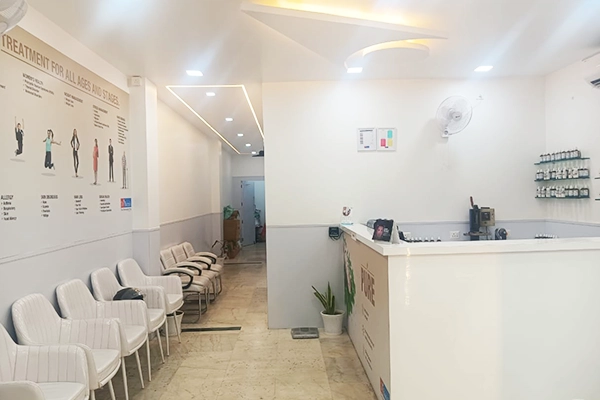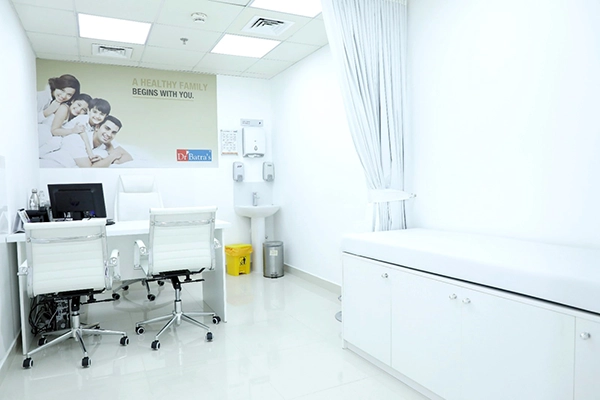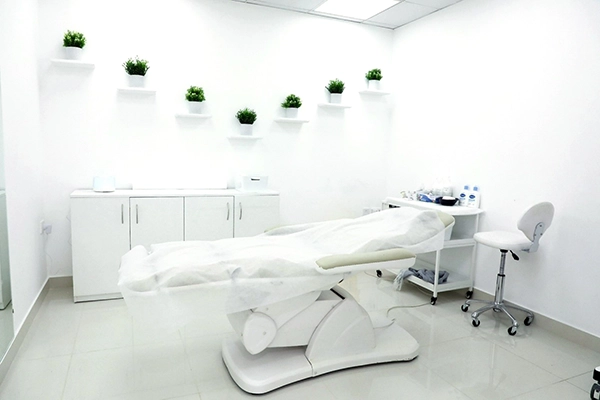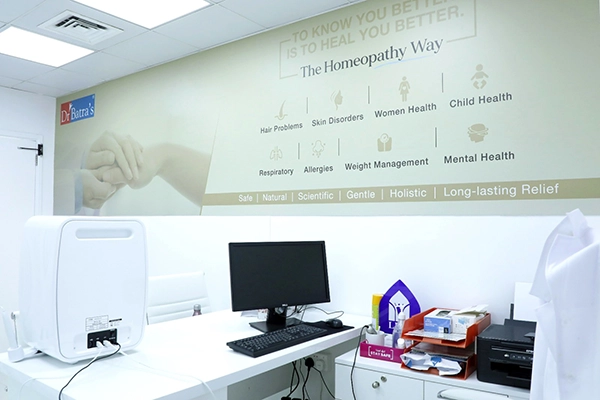Leucorrhoea
Get Leucorrhea treatment in Dubai that is safe and effective at Dr Batra's® UAE clinics.
Leucorrhea, commonly referred to as abnormal vaginal discharge, can cause discomfort and worry. At Dr Batra's, we understand that it is a very sensitive and personal concern.
We have over 40 years of expertise in homeopathy and a dedicated team of qualified doctors, who will examine you and recommend homeopathic treatments that can treat Leucorrhea at the root cause level.
Our homeopathic treatments are designed to restore balance to your body while addressing symptoms like excessive discharge, itching, and discomfort. Whether you're experiencing these issues due to infections, hormonal imbalances, or other underlying conditions, our doctors use advanced diagnostic tools and personalized care to create a customised treatment plan for your needs.
At Dr Batra's, your health and well-being come first. With a strong track record of success and a patient-first approach, we are proud to be a trusted choice for Leucorrhea treatment in Dubai. Book your consultation today and take the first step toward a healthier, more confident you.
Why Choose Dr Batra's® for Leucorrhea Treatment in UAE?
Global network of qualified homeopathic doctors
At Batra’s®, we have one of the largest networks of homeopathic doctors in the world with over 350 homeopaths practicing globally.
Our homeopaths are medically qualified and have completed a 5 ½ years degree course in homeopathy that includes medicine, gynaecology, anatomy, physiology, and psychology. We also have over 45 specialists MDs [Medicine in Homeopathy [M.D.(Hom)] across the globe.
Customized treatment for every patient
We at At Batra’s® present you with holistic and personalized treatment. Our treatment extends beyond just physical symptoms, thereby correcting the deep seated emotional concerns of the patient, which in many cases are the cause of medical disorders.
E-medical records / cross referencing made easier
Centralized recording of data enables patients to consult our homeopaths in any of our clinics across the world. Cross referencing becomes much faster, thereby deriving better treatment results for patients through our past experience.
Get Leucorrhea Treatment at Conveniently Located Clinics in Dubai & Abu Dhabi





Treatment Approach for Leucorrhea at Dr Batra’s® UAE
Step 1: First Consultation – At your first consultation, our doctors will spend 30-45 minutes with you. This is important for us to understand the root cause of your condition and suggest a customized treatment based upon your clinical history of complaints and lifestyle or any other factor that might have caused Leucorrhea.
Step 2: Medical Diagnosis – Diagnosis includes a physical examination by our doctors to identify and confirm the type of infection. Diagnosis also depends upon your symptoms, frequency, time and nature of the discharge and few other factors. Blood tests might be recommended to confirm the diagnosis.
Step 3: Personalized Treatment - Natural homeopathic medicines are suggested based on the diagnosis made and extent of the condition.
Step 4: Advice on nutrition – Our doctors consult you on self-care, personal hygiene, and right nutrition, which can not only improve chances of faster recovery but also prevent recurrence.
Let’s Understand About Leucorrhea
Leucorrhea is a thick, whitish or yellowish vaginal discharge. It is the most commonly experienced condition of women of reproductive age. Women experiencing vaginal discharge, at first instance, feel very embarrassed and worried as to why they are suffering from this problem.
Though majority of the women fear and think of it as a disease, usually it is a sign of just an infection. It is normal to experience vaginal discharge few days before menarche (before a woman starts on her periods for the first time), just before periods and during a sexual fantasy or sexual stimulation.
Some amount of discharge is normal and essential for vaginal lubrication. However, the amount of discharge may increase due to vaginal infections and may come and go from time to time.
This condition can be quite embarrassing if characterised by foul-smelling vaginal discharge. Leucorrhea can often be a pointer to various gynaecological conditions and infertility, and hence requires evaluation and treatment.
Causes of Leucorrhea
The most common conditions that might result into leucorrhoea include the following:
- Pregnancy, premenstrual or menstrual periods and congestion of the uterus;
- Infection of female genital organs;
- Irritation due to mechanical factors such as use of chemical contraceptives, intrauterine devices, etc.;
- Emotional causes such as stress, anxiety, work pressure and sexual anxiety;
- hormonal irregularities;
- Errors in diet, excessive use of stimulants, e.g., tea, coffee, alcohol and smoking; and
- Medical conditions such as anaemia, tuberculosis, etc.
Symptoms of Leucorrhea
Leucorrhea can be quite an uncomfortable condition for women due to the following symptoms:
- Intense itching of the vulva;
- Soreness of the vulva;
- Unusual vaginal discharge;
- Fish-like smelly discharge;
- Yellowish or thick curd-like discharge;
- Vaginal bleeding in between two menstrual cycles;
- Severe pain or menstrual-like cramps in the lower part of the abdomen;
- Pain during or after sex;
- Bleeding during or after sex;
- Pain while passing urine;
- Vaginitis;
- Skin lesions around the vagina;
- Vulvae edema (swelling of the vagina); and
- Lower back pain.
If you are experiencing any of the above signs and symptoms, then it is advisable to get a medical evaluation done as early as possible.
How is Leucorrhea Diagnosed
Diagnosis includes a physical examination by our doctors to identify and confirm the exact cause of Leucorrhea. Their diagnosis also depends upon the frequency of symptoms, nature of the discharge, type of infection and other medical history.
Leucorrhoea is a common but manageable condition with the right care and treatment. At Dr Batra's®, our qualified doctors are here to provide safe, effective, and personalized solutions to treat leucorrhoea at its root cause. Don’t let discomfort hold you back—take the first step toward better health and confidence today. Book your consultation at one of our conveniently located homeopathy clinics in Dubai or Abu Dhabi and experience compassionate care tailored just for you.
FAQs
Can leucorrhoea be completely cured with homeopathy?
Yes, homeopathy can treat leucorrhoea effectively by addressing its root cause and providing long-lasting relief without side effects.
How long does homeopathic treatment for leucorrhoea take?
The duration depends on the severity of your symptoms and underlying causes. Most patients see improvement within a few weeks to months.
Is leucorrhoea a sign of a serious health condition?
While leucorrhoea is often caused by infections or hormonal changes, it can sometimes indicate more serious gynecological issues. A proper diagnosis is essential.
Can stress worsen leucorrhoea symptoms?
Yes, stress and anxiety can contribute to hormonal imbalances, which may worsen leucorrhoea symptoms.
What lifestyle changes can help manage leucorrhoea?
Maintaining good hygiene, eating a balanced diet, staying hydrated, and avoiding stress can help manage leucorrhoea effectively.
Can leucorrhoea affect fertility?
In some cases, untreated leucorrhoea may indicate infections or gynecological conditions that could impact fertility. Early treatment is key.
Are there any foods that can worsen leucorrhoea symptoms?
Excessive consumption of stimulants like caffeine, alcohol, and spicy foods can sometimes aggravate symptoms.
Is it normal to have leucorrhoea during pregnancy?
A mild increase in vaginal discharge is common during pregnancy. However, unusual discharge with a strong odor or discomfort should be evaluated by a doctor.
Can homeopathic treatment prevent recurrent leucorrhoea?
Yes, homeopathy strengthens your immune system and addresses the root cause, helping to prevent recurrences.
Do I need to stop using contraceptives if I have leucorrhoea?
Not necessarily. However, if contraceptives are causing irritation or contributing to symptoms, your doctor may recommend alternatives.



